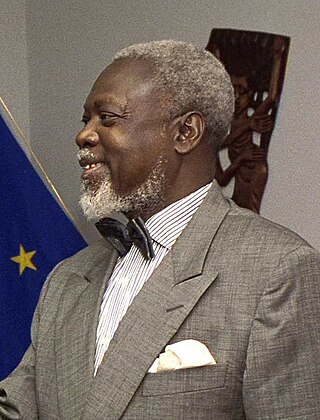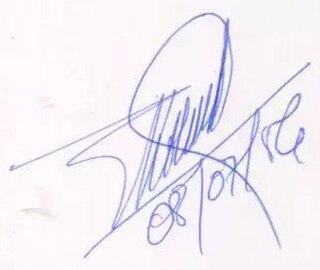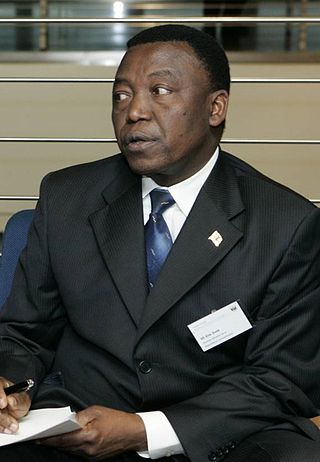Related Research Articles

François Bozizé Yangouvonda is a Central African politician who was President of the Central African Republic from 2003 to 2013. He was the only Central African president born in modern-day Gabon.

Ange-Félix Patassé was a Central African politician who was president of the Central African Republic from 1993 until 2003, when he was deposed by the rebel leader François Bozizé in the 2003 coup d'état. Patassé was the first president in the CAR's history to be chosen in what was generally regarded as a fairly democratic election (1993) in that it was brought about by donor pressure on President André Kolingba and assisted by the United Nations Electoral Assistance Unit.

André-Dieudonné Kolingba was a Central African politician, who was the fourth President of the Central African Republic (CAR), from 1 September 1981 until 1 October 1993. He took power from President David Dacko in a bloodless coup d'état in 1981 and lost power to Ange-Félix Patassé in a democratic election held in 1993. Kolingba retained the strong support of France until the end of the Cold War in 1992, after which both internal and external pressure forced him to hold presidential elections which he lost.

Martin Ziguélé is a Central African politician who was Prime Minister of the Central African Republic from 2001 to 2003. He placed second in the 2005 presidential election and is currently the President of the Movement for the Liberation of the Central African People (MLPC).

Élie Doté is a Central African politician. He was Prime Minister of the Central African Republic from June 2005 to January 2008.

Anicet-Georges Dologuélé is a Central African politician who was Prime Minister of the Central African Republic from 4 January 1999 to 1 April 2001. Subsequently, he was President of the Development Bank of Central African States (BDEAC) from 2001 to 2010.
Jean-Luc Mandaba was Prime Minister of the Central African Republic from 25 October 1993 to 12 April 1995 under President Ange-Félix Patassé.
Timothée Malendoma was a Central African politician who served as the 12th Prime Minister of the Central African Republic from 4 December 1992 to 26 February 1993. He was the President of the Civic Forum party.
Enoch Derant Lakoué is a Central African politician who was Prime Minister of the Central African Republic from 26 February 1993 to 25 October 1993.
Édouard Frank is a Central African magistrate and political figure. He was Prime Minister of the Central African Republic from 15 March 1991 to 4 December 1992.
Simon Narcisse Bozanga was a Central African politician. He was Prime Minister of the Central African Republic from 4 April 1981 to 1 September 1981, when his government was overthrown by a military coup.
Emmanuel Touaboy is a Central African diplomat from Bossangoa, Central African Republic.

Abakar Sabone is a politician of Central African Republic. Previously he was the leader of the Movement of Central African Liberators for Justice rebel group during the Central African Republic Bush War.

Joseph Kalite was a Central African politician and doctor. As a government minister he either held the housing or health portfolio. Kalite, a Muslim, was reported to be killed by anti-balaka outside the Central Mosque in the capital Bangui during the Central African Republic conflict. He was killed with machetes on the day in Bangui after interim president Catherine Samba-Panza took power. At the time of the attack Kalite held no government position, nor did he under the Séléka rule. He was reported to have supported the rule of Séléka leader Michel Djotodia.
A coup d'état occurred in March 2003 in the Central African Republic when the forces of General François Bozizé marched on Bangui, the country's capital, while President Ange-Félix Patassé was attending a regional Community of Sahel–Saharan States leaders' summit in Niger.

Central African Republic–France relations are foreign relations between the Central African Republic (CAR) and France. Both nations are members of the Francophonie and the United Nations.
Léa Mboua Koyassoum Doumta is a Central African politician and teacher.
Théodore Dabanga is a Central African banker and economist who served as Minister of Finance and Budget during Bozize's administration.
Colonel Mohamed Mahdi Marboua was a Central African military officer and politician.
Laurent Gomina-Pampali is a Central African politician, writer, philosopher, and professor who served as Minister of Foreign Affairs (1990–1991) and Member of the National Assembly.
References
- Bradshaw, Richard; Fandos-Rius, Juan (2016). Historical Dictionary of the Central African Republic. Scarecrow Press. ISBN 978-0810879928.
- Karatnycky, Adrian (1998). Freedom in the World: The Annual Survey of Political Rights & Civil Liberties 1997-1998. Transaction Publishers. ISBN 978-0-7658-0476-1.
- Lea, David; Rowe, Annamarie (2001). A Political Chronology of Africa. Taylor & Francis. ISBN 1857431162.
